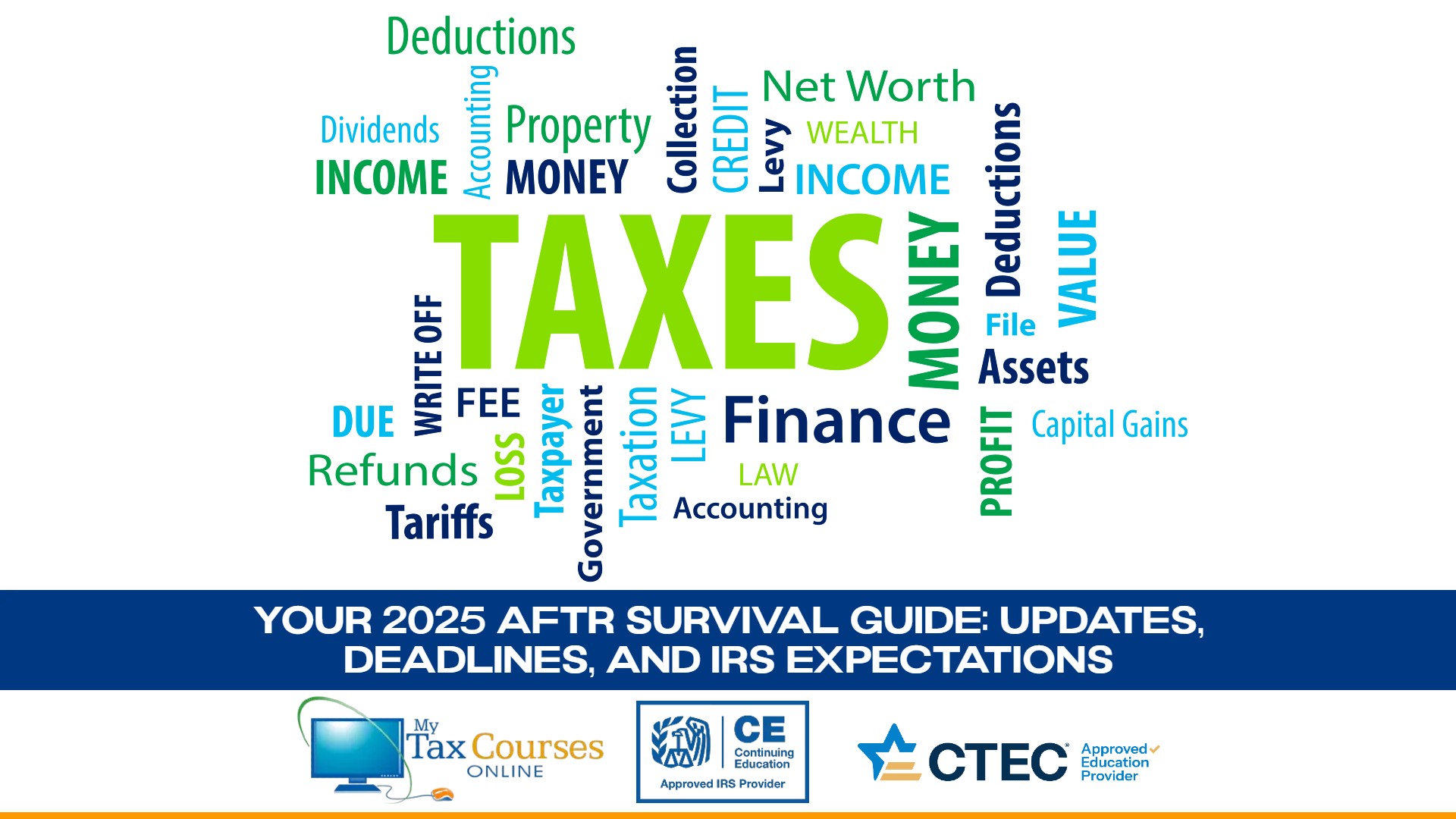As the 2025 tax season approaches, tax preparers have one major tool to stay sharp: the IRS Annual Federal Tax Refresher (AFTR) Course. Part of the Annual Filing Season Program (AFSP), this course is a must for non-credentialed tax return preparers who want to earn the Record of Completion—and stay ahead of the many changes coming to the tax code this year.
The 2025 AFTR Course isn’t just a refresher—it’s a roadmap to everything that’s new, revised, or reinforced for the 2025 filing season. From updated thresholds and inflation adjustments to new reporting requirements and credits, this year’s content is packed with critical updates that impact individual 1040 tax returns.
What’s New for 2025?
The 2025 AFTR Outline and Course reflects key updates tax professionals need to know, including:
Inflation Adjustments (Rev. Proc. 2024-40)
Each year, tax brackets, standard deductions, and credit phase-outs are adjusted for inflation. The AFTR includes updated figures for:
- Standard deduction amounts
- Earned income credit thresholds
- Gift tax exclusions
- Estate tax unified credit
- Retirement contribution limits (with IRA limits holding steady at $7,000, but 401(k) limits increasing to $23,500)
New 1099-K Reporting Requirements
The IRS continues to phase in new lower thresholds for third-party network transactions (e.g., PayPal, Venmo). In 2025, the reporting threshold remains at $5,000, a significant change from the original $600 planned under the American Rescue Plan.
IRS Direct File Pilot Expansion
The IRS’s Direct File pilot program allows eligible taxpayers to file online for free directly through IRS.gov. In 2025, this initiative expands and will likely become a key point of discussion with clients who qualify to use it instead of a tax preparer.
SECURE 2.0 Act Enhancements
Two new provisions take effect:
- Higher catch-up contribution limits for taxpayers aged 60–63
- An expanded definition for eligibility to contribute to ABLE accounts, which now includes individuals with onset of disability up to age 46 (effective for tax years after 2025)
Energy & Clean Vehicle Credits
Updated guidance clarifies eligibility for:
- The Energy Efficient Home Improvement Credit
- Clean Vehicle Credits under IRC §§ 30D(g) and 25E(f)
The credits now reflect more detailed manufacturer requirements and adjusted income limits.
What the 2025 AFTR Course Covers
The AFTR Course is structured into three domains:
Domain 1: New Tax Law / Recent Updates
Get an in-depth look at all the new changes listed above, including:
- Cost-of-living adjustments
- Mileage rate changes (Notice 2025-05)
- Direct File availability
- Updates to Forms 1099-K, 1099-R, and SSA-1099
- SECURE 2.0 retirement and ABLE account changes
Domain 2: General Review
This section revisits the essentials with 2025 updates baked in:
- Schedule C revisions, Section 179 and bonus depreciation (now reduced to 40%)
- New depreciation limits for luxury autos (Rev. Proc. 2025-16)
- Itemized deduction thresholds and changes to medical, charitable, and mortgage deductions
- Education, child, and earned income credits, with updated eligibility
- Expanded treatment of digital assets and net operating losses
- Health account limits (HSA, FSA, MSA)
- Withholding and estimated tax planning
Domain 3: Practices, Procedures & Ethics
Stay compliant with the latest rules around:
- Identity theft and safeguarding taxpayer data
- Due diligence for credits (Form 8867)
- Preparer penalties and E-file rules
- ITIN renewals and IRS consent requirements under Circular 230
- AFSP qualifications and limited representation rights
Why Take the 2025 AFTR Course?
If you're a non-credentialed tax preparer, completing the AFTR Course is essential to:
- Earn your AFSP Record of Completion
- Be listed in the IRS public directory of preparers
- Gain limited representation rights before the IRS
- Stay ahead of compliance risks and tax law changes
- Improve client service with accurate, up-to-date knowledge
The Bottom Line: Don’t Just Prepare—Excel
The 2025 AFTR Course is your annual opportunity to reinforce your expertise, refresh your skills, and navigate the latest developments with confidence. From new thresholds to updated credits and IRS procedural shifts, this year’s AFTR content is more crucial than ever.
Take the course. Pass the test. Earn your certificate. Stay trusted and ahead of the curve this tax season.





